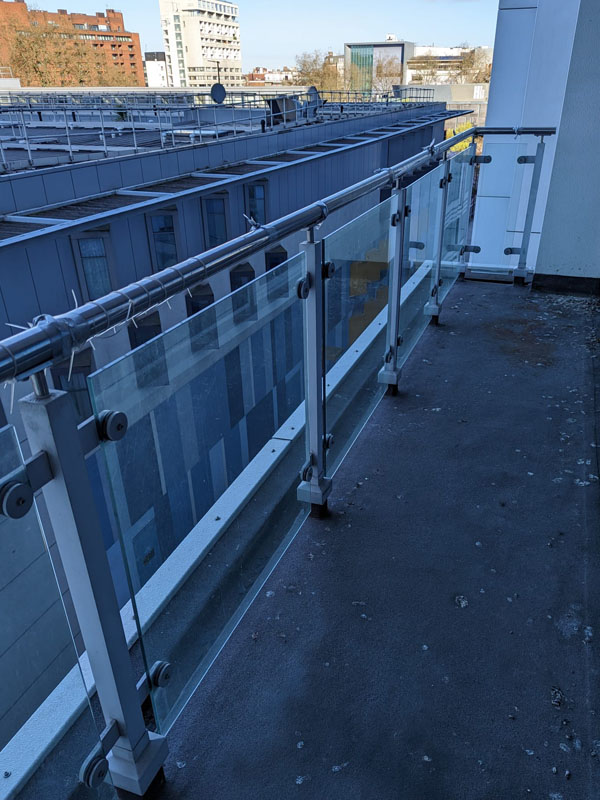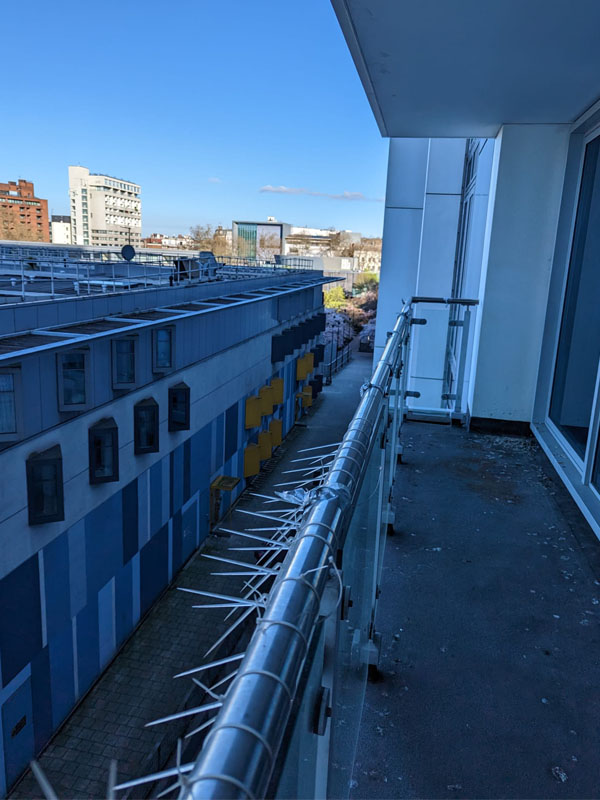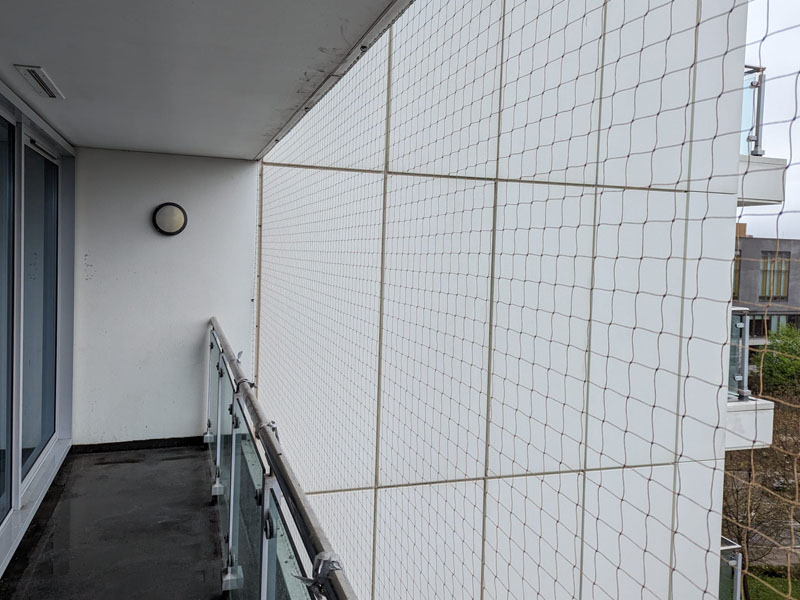We were called to a flat in London. The owners were experiencing problems with pigeons constantly perching on their balcony, causing a nuisance with noise and mess. They had tried to stop this be using cable ties as spikes but this had failed to work. Here we look at why pigeons are a nuisance, what damage they can cause and the solutions.


Why are Pigeons a nuisance?
Pigeons are a known source of more than 110 pathogens, and research indicates that other wild birds can also transmit diseases to humans. These diseases can be transmitted through contact with bird droppings and the birds themselves. Dry pigeon droppings can become airborne, leading to respiratory issues. To avoid the risks, it’s crucial to wear proper personal protective equipment (PPE) when cleaning up after birds. Poor food hygiene practices or direct contact with droppings can also lead to the spread of food-borne bacteria to humans, making it important to keep birds away from food manufacturers and distributors.
Bird droppings are slippery and pose a significant risk on pavements, especially under roosting birds. They are acidic and can corrode metals, stonework, and brickwork, while nesting materials used by birds can block chimneys, flues, and guttering, potentially causing carbon monoxide issues and building damage from water overflow. The fouling can also lead to an unpleasant smell and an unappealing appearance, which can harm an organization’s reputation.
Birds carry parasites that can cause secondary infestations, including bird mites, ticks, fleas, and beetles. Those who have had problems with birds in the past or currently may also suffer from a parasite infestation.
About pigeons and their behaviour
Feral pigeons are descended from domesticated rock doves and are often supported by escaped racing pigeons. These birds are known to build their nests in bridges, buildings, and any other structures with easily accessible shelter. Both male and female pigeons work together to construct their nests using materials such as grass, twigs, feathers, and even litter like plastics and wires. Over time, the nests can become quite large and can quickly become thick with droppings.
Pigeons typically breed between March and July, and under optimal breeding conditions, they can have up to seven broods in one season. It takes approximately 18 days for two eggs to hatch, and with sufficient access to food, the young can become independent adults within 30 days. More eggs can be laid before the young have even left the nest, which can lead to rapid population growth.
Wild pigeons have a lifespan of up to four years and primarily rely on human food scraps, spillages, or foraging from newly sown farmland. In town centers, they are often seen feeding in large flocks that can range in size from 50 to over 400 birds. Pigeons also have a social order, where dominant birds feed first and have access to the best breeding sites.
One of the most effective ways to deter pigeons is to eliminate their food source. This can be achieved by covering bins, cleaning up spillages, and restricting access to food. Most importantly, avoid feeding the pigeons as it only encourages them to return.
Proofing structures with nets, spikes, and mesh can prevent pigeons from perching and roosting. However, scaring techniques like visual and audio methods are not as effective since pigeons can adapt quickly to new things.
Using flying birds of prey regularly can be helpful in deterring pigeons. Lethal control can also be considered in extreme cases where pigeons have entered food premises or have overcome proofing measures. However, culling pigeons to reduce flock sizes is usually ineffective unless access to food is restricted.
Pigeons are attracted to urban areas with available nesting/roosting sites like balconies, window ledges, and roof areas of surrounding buildings. A reliable food source is also essential for their survival. Thus, removing bird food sources or blocking off sites where they perch or roost is crucial in preventing them from causing a problem.
The number of birds attracted to an area depends on the availability of food. Feeding birds only leads to an increase in their population, so food sources must be kept to a minimum. Keep bin lids closed and cover compost bins to discourage pigeons from scavenging for food.
When to Involve Bird Control
Specialised skills, equipment, and tools are necessary for bird prevention, proofing, and control. Killing birds should only be considered when all non-lethal control methods have been deemed impractical. It is important to note that all wild birds, their eggs, and nests are protected by law, therefore, we strongly advise against attempting to manage or control birds on your own.
Installing Bird Netting to Prevent Pigeons
To address the issue of nuisance birds, there are several options available, but bird netting often proves to be the most effective solution. Designed for roofs, bird netting can cover large areas, preventing birds from landing or nesting. It is also adaptable for use on shelters, signs, bridges, and canopies. What makes bird netting versatile is that it can be installed permanently, temporarily, or seasonally.
As experts in installing bird netting, we understand the importance of managing nuisance birds effectively. Our bird netting can deter birds from landing on your property and encourage them to find alternative habitats. We also recognize that cleaning up after birds can be costly and time-consuming, which is why we believe that bird netting is a cost-effective solution. While there is a cost to installing bird netting, it is considerably less than the ongoing expense of cleaning up bird droppings to maintain the appearance of your property.



Contact Pigeon Control
Pigeon Control only uses humane methods to remove and deter pigeons from your home or business. Our team of experienced pigeon control specialists will assess the severity of the infestation and recommend the best course of action to remove the pigeons and prevent future infestations.
We also provide ongoing maintenance contracts to help ensure that your property remains pest-free. Our goal is to provide our clients with a comprehensive and effective pigeon control solution that is tailored to their specific needs.
If you’re experiencing pigeon problems, contact Pigeon Control today. Our team of experts will be happy to provide you with a free, no-obligation quote and answer any questions you may have about our services.
Contact us through our website or for 24-hour callout please call us on 0203 600 1045.
